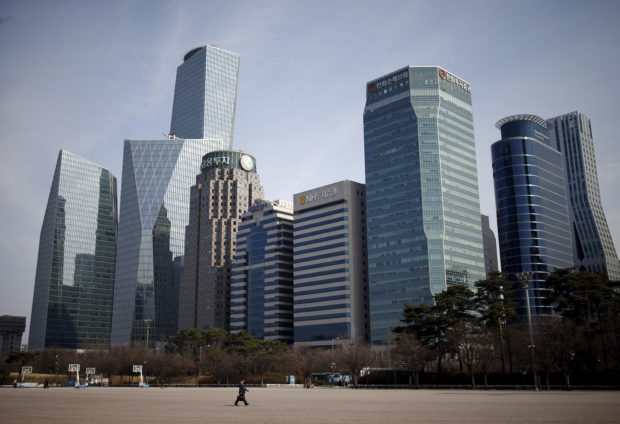S.Korea eyes fiscal discipline with first spending cut in 13 years

A man walks in a park at a business district in Seoul, South Korea, March 23, 2016. REUTERS/Kim Hong-Ji/File photo
SEOUL – South Korea said on Tuesday it would cut annual government spending for the first time in over a decade next year, as it seeks to curb its pandemic-era stimulus and help the central bank rein in a red-hot economy.
Unveiling the first budget proposal under right-leaning President Yoon Suk-yeol, the finance ministry said government expenditure will be 639 trillion won ($473 billion) in 2023.
That is 6 percent smaller than this year’s spending after two supplementary budgets, and would be the first annual decline in spending since 2010, assuming there are no additional budgets for 2023.
Excluding extra budgets, South Korea’s 2023 spending will grow by 5.2 percent, the slowest since 2017.
The move marks a shift away from aggressive fiscal spending under predecessor Moon Jae-in’s left-leaning government in recent years and from the massive stimulus measures taken during the pandemic to help the economy withstand the COVID-19 crisis.
It comes as the Bank of Korea, which has been at the forefront of a global tightening cycle, has raised interest rates by a total of 2 percentage points since August last year.
By contrast, governments from Australia to Canada have continued expansionary fiscal policies so far even as their central banks have raised rates to tackle soaring inflation.
“The government is shifting its fiscal policy stance completely to ‘sound financing’ to secure fiscal sustainability, improve external credit standing and spend responsibly for future generations,” the South Korean ministry said in a statement.
To achieve the 2023 spending cut, the government said it would “transfer some public projects to the private sector” and would cut wages of senior officials at the highest levels of government, according to the budget.
But the budget also foresees an increase in social welfare expenses for low-income earners and the vulnerable, with demand for welfare spending only likely to grow in a rapidly aging economy. South Korea’s birth rate hit a fresh record low of 0.81 child per woman last year.
South Korea’s ratio of fiscal deficit to gross domestic product (GDP) will narrow to 2.6 percent next year from an estimated 5.1 percent this year after extra spending, the finance ministry said.
The debt-to-GDP ratio will fall for the first time in five years to 49.8 percent from 50 percent, according to the ministry.
The Yoon administration aims to maintain the ratio of fiscal deficit to GDP at a mid-2 percent level and the debt ratio below the mid-50 percent level until 2026, and is preparing a bill to make these targets legally binding.
The finance ministry said it will issue 167.8 trillion won of bonds in 2023, down from a total of 177.3 trillion won this year. The net increase in treasury bonds is projected at 61.5 trillion won.
The government plans to submit the budget plan to the national assembly on Friday.
($1 = 1,350.0400 won)